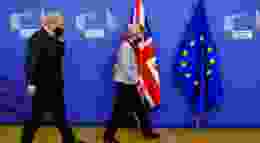
Boris needs a lesson in statecraft
Wherever the wind is blowing – a publicity obsessed Johnson has many lessons to learn from elder statesmen regarding the importance of sacrificing short-term popularity for long-term policy gain, writes Damien Philips.
"For my part, I favour an approach to statecraft that embraces principles, as long as it is not stifled by them; and I prefer such principles to be accompanied by steel along with good intentions." Margaret Thatcher's wise words could have been written exclusively for Boris Johnson as the awkward reboot of his government falters. If Boris is to make the rest of his premiership a success, embedding lasting reform that takes us beyond both Covid and Brexit, he needs to start seeking lessons in statecraft.
In days gone by, Boris could have picked up the phone to Lee Kuan Yew. The late former Prime Minister of Singapore was rightly viewed as the master of statecraft – otherwise known as the skilful management of state affairs or statesmanship. Yew's transformation of a tiny, former British colonial trading post into a thriving Asian metropolis with world-class airlines, airports, a thriving port of trade and amongst the highest per capita real income is the stuff of legend.
A repeated criticism of Boris is that he is "a man of no certain political principle who likes to be liked" – dangerous characteristics in an aspiring statesman. The buffeting of the Johnson administration from one ill-considered u-turn to the next, even before the Covid crisis, at the mercy of the next negative newspaper headline, shows the risk of such an approach. This is a far cry from the dogged and tenacious Yew, who "always tried to be correct, not politically correct".
If Mr Yew were still alive today, no doubt he would remind Boris that the process of nation building is often arduous, that meaningful change will attract controversy, and that you must stick to your guns over the long haul to see your vision through. Much like the great Margaret Thatcher, he placed little stock in endlessly courting public opinion, "I have never been over concerned or obsessed with opinion polls or popularity polls. I think a leader who is, is a weak leader. If you are concerned with whether your rating will go up or down, then you are not a leader. You are just catching the wind … you will go where the wind is blowing. And that's not what I am in this for."
But with the loss of Yew in 2015, who should Boris now turn to for guidance? In 2020, Qatar's ruling Al Thani family have become the unlikely successors to the mantle of statecraft masters. Qatar's recent announcement that it will hold direct elections to the country's top advisory body, the Shura Council, is a classic example of its growing commitment to far-sighted transformation at a pace that its society can effectively integrate. The changes have been described by the current Emir Sheikh Tamim bin Hamad Al Thani as "an important step towards strengthening Qatari advisory traditions and developing the legislative process with a wider participation of citizens".
The elections will allow Qatari citizens to choose 30 of the country's 45-seat Shura Council and, following the elections, the council's power is expected to be expanded to include the ability to dismiss ministers, approve the national budget, and propose legislation. Students of statecraft can see where this is heading. The former British protectorate is building on its dramatic success in the economic realm – rapidly becoming one of the richest nations on earth since its independence in 1971 – by taking steady but sure steps towards becoming a durable open society.
The lesson for Boris here is how to maintain a constant course of positive transformation in the face of slings and arrows. Qatar has been resolutely making these gradual changes while being attacked by a series of naive and envious rivals angered by its success and mired in a false 'fixed quantity of wealth' mindset – a mercantilist notion that wealth creation in one nation must come at the expense of others.
If Boris thinks the EU is spiteful and insecure, this is nothing to those competing with Qatar who continually accuse it, without evidence, of supporting terrorism and extremism and who have implemented a blockade of the Gulf state for the last three years. Singapore went through a similar phase where its economic success and stability were overlooked in favour of attacks and disinformation from its regional competitors about Lee Kuan Yew's "fascist" tendencies.
Boris must recognise, like Al Thani and Yew before him, that meaningful, well-thought out reform and lasting change creates friction in the short term and success in the long term – and that both breed criticism and enemies. The successful statesman charts a difficult course bolstered by an unwavering determination that will be continually tested – this is what Thatcher meant by principles being "accompanied by steel". Boris must learn from the greats and find his.






